初中英语易混单词
英语初中常用易混淆单词词组的区别用法

中考初中英语常用易混淆单词词组的区别用法英语常用易混淆单词/词组的区别用法一、how much和how many的区别用法how much和how many的区别:how much用来询问事物的数量,后接不可数名词;how many用来询问事物的数量,后接可数名词复数。
how much和how many的区别1、所修饰词不同how much用来修饰不可数名词,表示数量,也可单独使用。
how many用来修饰可数名词的复数,它的句式是:How many+复数名词+一般疑问句+?例句:How much milk is there in the glass?玻璃杯里有多少牛奶?How many books are there on the desk?有多少本书在桌子上?2、用法不同How much 表示多少钱,用来问价格。
例句:How much is this dress?这个连衣裙多少钱?How many 表示多少,用来问数量。
例句:How many apples do you have?你有多少苹果?二、in和on的区别用法当我们表示某些东西被其他东西所包围时使用“in”这个词。
而“on”用于描述物体被放置在其他物体上方或外部的情况。
in可表时间,表地点,表手段、方法、材料。
on表示时间、地点、方位等。
in和on区别一、意思不同in:prep. 在 ... 里;在 ... 地方;在 ... 期间on:prep. 在 ... 之上二、用法不同in: in着重一段时间的过程,常用于重复动作或延续动作。
in表示从现在时间算起推移到将来的一段时间之后,一般与将来时态连用。
例句:He is a layman in economics.他对经济学一窍不通。
on:表示“在物体的表面上”,只能用on的表达方式有on the next morning,on the following。
例句:The spider is walking on the ceiling.蜘蛛在天花板上爬行。
初中英语易混词、短语辨析
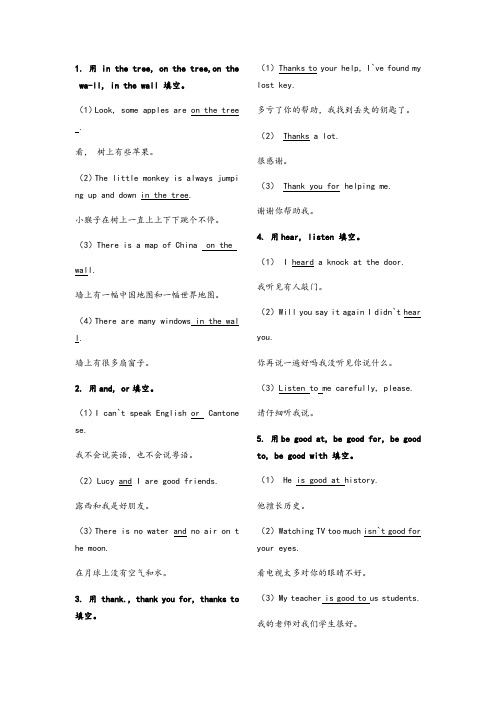
1. 用 in the tree, on the tree,on the wa-ll, in the wall 填空。
(1)Look, some apples are on the tree .看,树上有些苹果。
(2)The little monkey is always jumpi ng up and down in the tree.小猴子在树上一直上上下下跳个不停。
(3)There is a map of China on thewall.墙上有一幅中国地图和一幅世界地图。
(4)There are many windows in the wal l.墙上有很多扇窗子。
2. 用and, or填空。
(1)I can`t speak English or Cantone se.我不会说英语,也不会说粤语。
(2)Lucy and I are good friends.露西和我是好朋友。
(3)There is no water and no air on t he moon.在月球上没有空气和水。
3. 用 thank., thank you for, thanks to 填空。
(1)Thanks to your help, I`ve found my lost key.多亏了你的帮助,我找到丢失的钥匙了。
(2) Thanks a lot.很感谢。
(3) Thank you for helping me.谢谢你帮助我。
4. 用hear, listen 填空。
(1) I heard a knock at the door.我听见有人敲门。
(2)Will you say it again I didn`t hearyou.你再说一遍好吗我没听见你说什么。
(3)Listen to me carefully, please.请仔细听我说。
5. 用be good at, be good for, be good to, be good with 填空。
人教版初中英语易混淆单词短语总结

vocabulary n. (可数名)by mistake地word n.;by accident有时地,不测处aloud adv. 作声地;大声地comma n.逗号(非常,反: quietly;silently)period n.句号loudly adv. 大声地;吵地question mark n. 号loud adv. 响亮地adj. 喧的;响亮的challenge n.挑 ( 复数 challenges)vt.挑pronounce vt . 拼;音pronunciation n. 音法;拼法specific adj.明确的;详细的specifi cally adv. 明确地;详细地special adj.特别的;特的specially adv. 地;特地especially adv. 特;特别;分外particular adj.非一般的;特的;特别的particularly adv. 特别;特地;特别地memorize vt.起来;熟;回起memorization n. ;回grammar n. 法grammatically adv. 法地;从法角度来,add A to B把A增添/充到B中add up to +数目达到⋯spoken English英口make a mistake = make mistakes solution.n. 解决方案;解答solve v. 解决later adv. 此后;一会此后late adj .晚;adv. 晚;lately adv. 近来;近来latest adj.最新的realize v.意到;(某人)(梦想)Eg: Finally, Kelsy realized her dream.come true (某人的梦想)Eg: Finally, her dream came true.matter vi.起重要作用;要Eg: I know Charles doesn't think this project is important, but it matters to me.afraid = terrified adj.惧怕的;愁的be afraid of ... = be terrified of ⋯恐惧 / 惧怕⋯be afraid to do = be terrified to do恐惧/惧怕做⋯laugh at⋯= make fun of⋯讥笑/嘲讽⋯complete vt.达成adj.完好的;完好的completely adv 完好地childhood n. 童年on duty班;日break off忽然中断;中断break down抛;出缺点break up分手take a ride兜take care小心,注意;珍重sb.be sure of sth.sb. be sure to do sth.sb. Be sure that⋯it is certain(无疑;确立) thatcertain adj.某,某些,某个Eg:friendly的比是friendlier,最高是friendliestcomic n.漫画,画志patient adj.耐心的n.病人patiently adv. 耐心地at the end of⋯in the endtake pride in⋯= be proud of⋯with pleasure能够用来答方的求,Eg: “Would you mind holding the door open forme, please ” “Oh, with pleasure.”It ’ s a pleasure.或It’s my pleasure.是用往返答感的答。
初中英语易混淆单词及短语简析

p se g r・ a sn es
A. o wih g t C.p a t ly wih
B.h l t ep wih D. a t de lwi h
A.p c p ik u
B.ma e u k p
C. e p g tu
D.s n p edu
“ 助某 人 ” 帮 之义 ;el i d a wt h是 “ 处理 , 付 , 对
涉及 ” 的含义 。
3 一 Mo . m,c n I a
— —
ቤተ መጻሕፍቲ ባይዱ
射, 使上 升 ” 的含义 。
t he TV?1wa tt n o
7 一 W h r r c o l lt e . o y u . e e a e my s h o oh s d o c
思。
6 .~ W h tr l o we h v n te hih y a u e d a e o h g wa ?
一
Bu o tt n h y tId n’ hi k te
c a! ot
h s n w i e
Bu e o c r a e s s r a s r no al we o t l o d t
【 解析 】 正确 的选择应 该是 A。owt g i h在这
儿是 “ … …相 配 , 跟 与… …相 伴” 的意思 ;l pa y wt i h的 意思 是 “ 玩弄 ,戏 耍 ”h l i :epwt h是
【 析 】A 为正 确 答 案 ,有 “ 车 接 载 解 用
( )拿 起 , 起 , 加 ( 人 , 捡 增 速度 ) 的 意思 ; a e ” m k u p有 “ 造 , 成 , 构 , 妆 ” 含 义 ;e 编 组 虚 化 的 gt u p有 “ 床 . 来 ” 意 思 : n p有 “ 起 起 的 s du e 发
人教部编版初中英语最易混淆拼错的英语单词全汇总

人教部编版初中英语最易混淆拼错的英语单词全汇总最容易拼错的150组单词1) quite 相当quiet 安静地2) affect v 影响, 假装effect n 结果, 影响3) adapt 适应adopt 采用adept 内行4) angel 天使angle 角度5) dairy 牛奶厂diary 日记6) contend 奋斗, 斗争content 内容, 满足的context 上下文contest 竞争, 比赛7) principal 校长, 主要的principle 原则8) implicit 含蓄的explicit 明白的9) dessert 甜食desert 沙漠v 放弃dissert 写论文10) pat 轻拍tap 轻打slap 掌击rap 敲,打11) decent 正经的descent n 向下, 血统descend v 向下12) sweet 甜的sweat 汗水13) later 后来latter 后者latest 最近的lately adv 最近14) costume 服装custom 习惯15) extensive 广泛的intensive 深刻的16) aural 耳的oral 口头的17) abroad 国外aboard 上(船,飞机)18) altar 祭坛alter 改变19) assent 同意ascent 上升accent 口音20) champion 冠军champagne 香槟酒campaign 战役21) baron 男爵barren 不毛之地的barn 古仓22) beam 梁,光束bean 豆been have 过去式23) precede 领先proceed 进行,继续24) pray 祈祷prey 猎物25) chicken 鸡kitchen 厨房26) monkey 猴子donkey 驴27) chore 家务活chord 和弦cord 细绳28) cite 引用site 场所sight 视觉29) clash (金属)幢击声crash 碰幢,坠落crush 压坏30) compliment 赞美complement 附加物31) confirm 确认conform 使顺从32) contact 接触contract 合同contrast 对照33) council 议会counsel 忠告consul 领事34) crow 乌鸦crown 王冠clown 小丑cow 牛35) dose 一剂药doze 打盹36) drawn draw 过去分词drown 溺水37) emigrant 移民到国外immigrant 从某国来的移民38) excess n 超过exceed v超过excel 擅长39) hotel 青年旅社hostel 旅店40) latitude 纬度altitude 高度gratitude 感激41) immoral 不道德的immortal 不朽的42) lone 孤独的alone 单独的lonely 寂寞的43) mortal 不死的metal 金属mental 神经的medal 勋章model 模特meddle 玩弄44) scare 惊吓scarce 缺乏的45) drought 天旱draught 通风, 拖拉draughts (英)国际跳棋47) assure 保证ensure 使确定insure 保险48) except 除外expect 期望accept 接受excerpt 选录exempt 免除49) floor 地板flour 面粉50) incident 事件accident 意外51) inspiration 灵感aspiration 渴望52) march 三月, 前进match 比赛53) patent 专利potent 有力的potential 潜在的54) police 警察policy 政策politics 政治。
人教部编版初中英语中考78个易混易错单词短语句型梳理
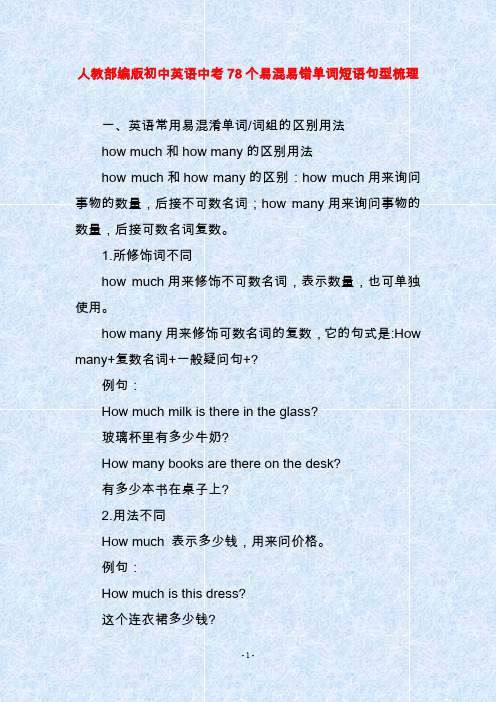
人教部编版初中英语中考78个易混易错单词短语句型梳理一、英语常用易混淆单词/词组的区别用法how much和how many的区别用法how much和how many的区别:how much用来询问事物的数量,后接不可数名词;how many用来询问事物的数量,后接可数名词复数。
1.所修饰词不同how much用来修饰不可数名词,表示数量,也可单独使用。
how many用来修饰可数名词的复数,它的句式是:How many+复数名词+一般疑问句+?例句:How much milk is there in the glass?玻璃杯里有多少牛奶?How many books are there on the desk?有多少本书在桌子上?2.用法不同How much 表示多少钱,用来问价格。
例句:How much is this dress?这个连衣裙多少钱?How many 表示多少,用来问数量。
例句:How many apples do you have?你有多少苹果?in和on的区别用法当我们表示某些东西被其他东西所包围时使用“in”这个词。
而“on”用于描述物体被放置在其他物体上方或外部的情况。
in可表时间,表地点,表手段、方法、材料。
on表示时间、地点、方位等。
1.意思不同in:prep.在 ... 里;在 ... 地方;在 ... 期间on:prep.在 ... 之上2.用法不同in:in着重一段时间的过程,常用于重复动作或延续动作。
in表示从现在时间算起推移到将来的一段时间之后,一般与将来时态连用。
例句:He is a layman in economics.他对经济学一窍不通。
on:表示“在物体的表面上”,只能用on的表达方式有on the next morning,on the following。
例句:The spider is walking on the ceiling.蜘蛛在天花板上爬行。
易混辨析

2012武汉市开发区一初中 中考英语总复习 易混词汇辨析take spend cost pay 的用法都可以表示“花费”,但用法却不尽相同。
常用于以下结构:(1) spend time /money on sth. 在……上花费时间(金钱)。
例:I spent two hours on this maths problem. 这道数学题花了我两个小时。
(2) spend time / money (in) doing sth. 花费时间(金钱)做某事。
例:They spent two years (in) building this bridge. 造这座桥花了他们两年时间。
(3)spend money for sth. 花钱买……。
例:His money was spent for books. 他的钱用来买书了。
还可以表示“值”, 常见用法如下: (1)sth. costs (sb.) +金钱,某物花了(某人)多少钱。
例:A new computer costs a lot of money. 买一台新电脑要花一大笔钱。
(2) (doing) sth. costs (sb.) +时间,某物(做某事)花了(某人)多少时间。
例:Remembering these new words cost him a lot of time. 他花了大量时间才记住了这些单词。
注意:cost 的过去式及过去分词都是cost,并且不能用于被动句。
常见用法有以下几种:(1) It takes sb. +时间+to do sth. 做某事花了某人多少时间。
例:It took them three years to build this road. 他们用了三年时间修完了这条路。
(2)doing sth. takes sb.+时间,做某事花了某人多少时间。
例:Repairing this car took him the whole afternoon. 他花了一下午修车。
初中英语全部易混词
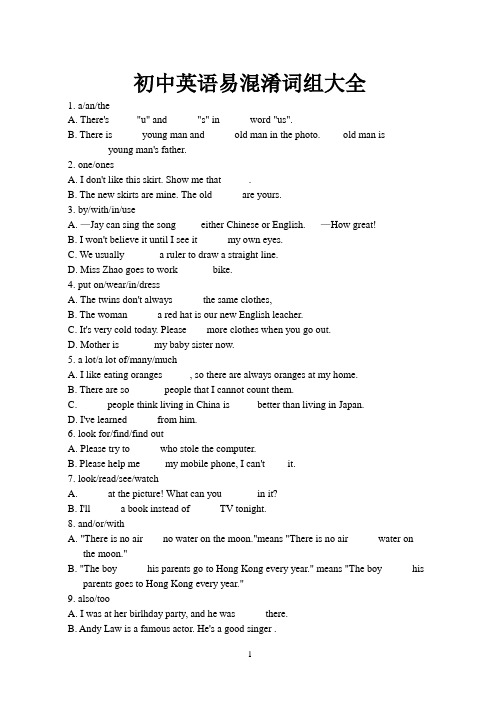
初中英语易混淆词组大全1. a/an/theA. There's_____ "u" and _____ "s" in _____ word "us".B. There is _____ young man and _____ old man in the photo. ____old man is_____young man's father.2. one/onesA. I don't like this skirt. Show me that _____.B. The new skirts are mine. The old _____ are yours.3. by/with/in/useA. —Jay can sing the song ____ either Chinese or English. —How great!B. I won't believe it until I see it _____ my own eyes.C. We usually ______ a ruler to draw a straight line.D. Miss Zhao goes to work ______ bike.4. put on/wear/in/dressA. The twins don't always _____ the same clothes,B. The woman _____ a red hat is our new English leacher.C. It's very cold today. Please ___ more clothes when you go out.D. Mother is ______ my baby sister now.5. a lot/a lot of/many/muchA. I like eating oranges _____, so there are always oranges at my home.B. There are so ______ people that I cannot count them.C. _____ people think living in China is_____ better than living in Japan.D. I've learned _____ from him.6. look for/find/find outA. Please try to _____ who stole the computer.B. Please help me ____ my mobile phone, I can't ____it.7. look/read/see/watchA. _____ at the picture! What can you ______ in it?B. I'll _____ a book instead of _____ TV tonight.8. and/or/withA. "There is no air ___ no water on the moon."means "There is no air _____ water onthe moon."B. "The boy _____ his parents go to Hong Kong every year." means "The boy _____ hisparents goes to Hong Kong every year."9. also/tooA. I was at her birlhday party, and he was _____ there.B. Andy Law is a famous actor. He's a good singer .10. take/bring/carry/getA. The woman was _____ a big bag. Let's help her.B. Next lime when you come, _____ me the book, please.C. Who's ____away today's newspaper?. I haven't read it yet.D. Go and _____ me some wate. I' m thirsty.11. each/everyA. "_____ of them speaks a foreign language." means _____ one of them speaks a foreignlanguage."B. There are some big shops on_____ side of the street.12. problem/questionA. What is the biggest _____ in the world? Can you answer this _____ ?B. The _____ is that he's always asking me such foolish _____.13. learn/studyA. He _____ hard and at last _____ the language.B. The children are _____ the maths problem now.C. We _____ in the same school, so we often _____ from each other and help each other.D. We _____ English in the morning and _____ to play football in the afternoon.14. in/on/atA. There are many good apples _____ the tree.B. He gets up ____six ___the morning and goes to bed __ten___ night ___weekdays.C. Does he have lunch _____ home?D. The man _____ duty is reading a book _____ medicine _____the desk.E. In the twins' bedroom, the windows _____ the wall are very big, the pictures _____ the wall are not very new.15. sometime/sometimes/some time/some timesA. Please read the text _____ until you can recite it.B. I will go shopping _____ tomorrow.C. He waited for _____ then left.D. They _____ play football after school.16. have/has/there is/there areA. In Class One _____ 25 boys and 25 girls.B. In Classroom One _____ a map of China.C. Does your brother _____ a map of China?D. _____ your brother got a map of China?17. right/all right/that's right/that's all/that's all rightA. —Thanks a lot for your help. —______.B. —Are you a student? —Yes.______.C. —Let's go shopping. —______.D. Could you tell me whether it is _____ or wrong?E. I want to buy a cup of tea, a piece of bread and an apple. _____.18. how many/much/long/old/oftenA. —_____ does it take by plane? —It takes about eleven hours.B. —_____ is your father? —He is fifty.C. —_____ is the fish? —It's ten yuan a kilo.D. —_____ do you write Io your father?. —Once a month.E. —_____ students are there in your class? —Forty-five.19. look up/look at/look after/look like/look the sameA. Please _____ Lucy and Lily because they are new here.B. Please _____ Lucy and Lily! Can you find any differences between them?C. Lucy and Lily are twin sisters. They _____ each other very much.D. Lucy and Lily _____.E. Please ______ the new words in your dictionary.20. what/which/who/whose/where/howA. —______ do you like China? —V ery much.B. —______ do you like about China? —The food and the people.C. —______ is Mr. Green? —He is an English teacherD. —______ is Mr. Green? —He is Jim's father.E. —______ falher is Mr. Green? —Jim's.F. —______ man is Mr. Green? —The man on a black bike.G. —______ is Mr. Green from? —He's from America.H. —_____ is Mr. Green like? —He is tall and thin.21. class/lessonA. He listens to the teacher carefully in _____.B. There are four _____ in each unit of the English textbook.22. in time/on timeA. You must give back the book to me _____.B. You're just _____ for the last bus.23. for short/short forA. TV is ________ television,B. They call me Tom _______ .24. may be/maybeA. Tom, ______ you are right.B. The woman over there ______ Li Lei's English teacher.25. begin/startA. When can we _____ off for Beiiing?B. He didn't know how to _____.26. other/another/the other/others/the othersA. Those shoes are too small for me. Would you show me _____ pair?B. There are six people in the room. Three are girls, _____ three are boys.C. He is always helping _____.D. There are many books in the box. Ten of them are mine, _____are my sisler's,E. Mr. Liu and Miss Sun and four ______ teachers are teaching this class.27. must/have toA. We _____ follow our Party to go.B. He _____ get up earlier because his mother asks him _____to cook breakfast.28. be good/be good to/be good atA. My parents ______ me.B. He ______ English.C. Chocolate ______ your health, do you agree?29. road/way/streetA. Can you tell me the ______ to your school?B. I met him in the ______.C. They drove along the country ______.30. in front/in front of/in(at) the frontA. Ricky stood _____ lhe stage and began to sing.B. He sits _____ and I sit not far behind him.C. A tree stands ______ the house.31. hope/wishA. I _____ you to win the competition.B. I _____ you can win the competition.C. We have no _____ to finish the work in time. What shall we do?D. Best _____ to all of you in the coming year!32. ago/beforeA. Everyone should come back _____ five o'clock.No one should be late.B. "He came back two days ____." means "He came back the day ____ yesterday."33. by the way/on the way in the wayA. The chair is _____. Please move it away.B. _____, have you got a computer at home?C. Roy happened to meet his father ______ to school.34. match/game/sportA. The Chinese basketball team had a _____with the American basketball team in the lastOlympic _____.B. I often do _____ or play with my classmates after school.C. There will be a _____ meeting next week.35. go on/go on doing/go on to doA. After they had read the text, the students ___the exercises.B. They _____ the farm work in the field though it was raining hard.C. I hope everything _____ well.36. at the end/in the end/by the end/to the endA. Go down this road _____ and you'll find the police station on your left.B. Which building is _____ of the road? Is it a supermarket or a hospital?C. Tim laughed _____ because he won the game,D. How many English words had you learnt _____ of last term?37. what/howA. "_____ a good film!" means _____ good the film is!"B. "_____ beautiful music!" means " _____ beautiful the music is!"C. "_____ is the weather?" means " _____ is the weather like?"38. in/to/onA. Japan is _____ the east of China and Taiwan is _____ the southeast of China.B. Henan is _____ the north of Hubei.39. just now/right nowA. I must go to my office .B. I made a telephone call to my friend ______.40. how often/how soon/how long/what timeA. —_____ will he be beck? —In a week.B. —_____ does he come back? —Once a week.C. —_____ were you in Beijing last year?. —For a week.D. —_____ did you go to bed last night? —At eleven.41. few/little/a few/a littleA. There's _____ time left. We'll be late if we don't hurry.B. We still have _____ apples at home. We needn't buy any now.C. There're _____ apples at home. You'd better go and buy some.D. I still have _____ money on me, so I can buy apples with it.42. neither/either/noneA. _____ of them is here. All of them have gone to Shanghai.B. _____ of his parents is a doctor. They are teachers.C. _____ Damao or Xiaomao will go there for the dinner. One of them should stay at home.D. He speaks _____ English nor Japanese. He speaks Chinese.43. both/all/wholeA. _____ the books are here. You may choose any of them!B. _____ of the twins like spending _____ their money on books.C. "The workers worked the _____ day." means. "The workers worked _____ day."44. cross/across/through/over/pass/pastA. The car _____ by with a thick smoke behind just now.B. The boss walked _____ me without saying a word at half _____ one. I don't know why.C. The sunlight is shining in _____ the window.D. " Go _____ the bridge." means " _____ the bridge."E. They climbed _____ the tall wall, didn't they?45. arrive/get/reachA. Please tell me when you'll _____in Taiyuan. I'll meet you at the airport.B. Can you tell me how to ____ to the nearest police station?C. Please call me when you _____ Shanghai.D. The passengers were worried because the train didn't ___on time.46. noise/sound/voiceA. Our physics teacher told us light travels faster than _____.B. "You have a beautiful____," the man said to her in a sweet ___.C. We shouldn't make any _____ in the reading room.47. so/norA. —They have supper at six every day. —_____ do we.B. —They don't use animals to do farm work now. —_____do we.48. be asleep/fall asleep/go to sleep/go to bedA. I usually _____ at half past nine every evening.B. The young man lay on the sofa and _____ soon.C. The baby _____. Please don't talk.49. pardon/sorry/excuse meA. ______, I am late.B. ______? I didn't hear what you said,C. ______, could you tell me the way to the station?D. I beg your ______, Sir, for coming here late.50. spend/take/pay/costA. "It ______ me an hour to read English every day." means" I ____an hour readingEnglish every day."B. The T-shirt ______ me eighty yuan. means " I ______ eighty yuan on the T-shirt. "C. "She ______ 100 dollars for the ticket." means " She ______ 100 dollars on theticket."D. I am going to _____ my summer holiday in my hometown.51. interest/interested/interestingA. Are you ______ in the ______ storybook?B. He says he has no ______ in visiting the places of ______. I don't know why.52. sleepy/sleep/asleepA. I didn't get to ______ until late last night.B. I felt very ______ because I didn't ______ well last night.C. He fell _____ during the meeting.53. as/likeA. Football is not so popular ______ ping-pong in Chino,B. If you do _____ I told you, you'll make fewer mistakes.C. You should do it ______ this,D. The girl looks ______ her mother.54. fall/dropA. Unluckily,the runner ______ his stick on the ground.B. I heard Tony ______ down from the tree and hurt his leg.55. miss/loseA. She ______ her wallet on her way to the supermarket.B. They were very sad because they ______ an important football game.C. We all ______ you very much. How soon will you be back?56. much too/too much/too manyA. Mr. Green eats _______ food, so he is ______ fat.B. I have ______ books to read and ______homework to do today.C. Watching TV ______ is bad for your health.57. be famous for/be famous asA. Yao Ming ______ a basketball player,B. China _______ its food in the world.58. look over/look up/look for/find/find outA. The old man _____ his money everywhere, but he couldn't ____ it.B. If you've ______ who broke the window, please tell me.C. If you don't know the new words, please ______ them _____in a dictionary,D. After the doctor _____ the patient very carefully, he said there was nothing serious.59. used to/be used to/wouldA. Granny ______ living in city now.B. He said he ______ come tomorrow.C. I ______ live with my grandparents, but now I have my own home.60. search/search for/findA. The police ______ their missing children here and there, but they didn't ______ him.B. The policeman _____the thief to see if he stole the money.61. none/no oneA. ______ of the workers went to see the film last night.B. —How many workers went to see the film last night? —______.C. —Who went to see the film last night? —______.62. have been to/have been in/have gone toA. They ______ Beijing for five years,B. They ______ Beijing three times.C. —Where're they? —They ______ Beijing.63. so/suchA. It is ______ a heavy box that he can't carry it.B. The box is ______ heavy that he can't carry, it.C. I had ___ much work to do that I slept very late last night.64. join/take part inA. The children ______ the English Evening and had a good time.B. When did your father ______ the Party, do you know?65. except/besidesA. Millie is good at sports ______ football, he also does well in playing basketball.B. We all passed the exam ______ Li Ming. How unlucky he is!66. die/dead/dying/deathA. "His father ______ two years ago." means "His father has been _____ for two years."B. Mary is always sad when she thinks of her little cat's ____.C. The doctors are trying to save the ______ man.67. as/for/since/becauseA. ______ everyone is here. let's start the meeting.B. —Why didn't he come to school? —______ he was ill.C. There must be nobody in the classroom, ______ the light is off.D. ______ I am young, I often give my seat to old ones on buses.68. still/already/yetA. He is over seventy. But he is ______ working on the farm.B. He has not come ______.C. They have ______ finished doing the homework.69. be able to/canA. Mum said "Huahua, you _____ watch TV after you finish doing your homework."B. They may _____ win the competition, for they have practised for a long time.C. Jim _____ not be in the office now, for he left an hour ago.70. own/have/there beA. I _____ a new computer. My uncle bought it for me as a birthday present yesterday.B. You should do it with your _____ hands.C. ____ a CD player on the desk. Whose is it?71. as well/too/also/eitherA. Mr. Green can _____ speak Chinese well.B. I haven't heard from him. She hasn't heard from him, ___.C. I have been to Beijing twice, _____.D. People in Korea celebrate the Spring Festival _____.72. give up/give inA. You can't _____ English, because it's very important.B. Finally I _____ and accepted the job.73. turn on/rum off/turn up/turn downA. Please _____ the radio. I can't hear the news clearly.B. Please _____ the radio. It’s too noisy.C. Please _____ the light. It's too dark here and I can't see anything.D. Please _____ the light when you leave here.74. try out/try onA. Please _____ the new shoes. I don't know if they fit you.B. The boy is clever and he likes _____ new ideas.75. hear of/hear from/hear aboutA. We haven't ______ him since last Christmas.B. I don't know the writer, but I have ______ him.C. I have never _____ such a funny story before.76. hand in/in handA. I have 1,000 yuan ______. But that's not enough.B. You should _____ your exam papers on time.77. send up/send away/send forA. The police were ______ when the accident happened.B. The boss ______ the worker because he was too lazy.C. Our country ______ another man-made satellite last year.78. thanks for/thanks toA. ____ the police, the parents found their lost child soon.B. ____ helping me with my English.79. steal/robA. The thief ______ the mobile phone from me.B. The man ______ me of my mobile phone.80. that/which/whoA. This is the best film _____ has been shown this year.B. You can take any seat _____ is free.C. Is there anything ______ I can do for you?D. Those ______ know the answer, put up your hands.E. The teacher, ______ comes from England, speaks English.【参考答案】1. A. a: an: the;B. a; an; The: the2. A. one;B. ones3. A. in;B. with;C. use;D. by4. A. wear;B. in;C. put on;D. dressing5. A. a lot;B. many;C. Many/A lot of; much/a lot;D. a lot/much6. A. find out;B. look for; find7. A, Look; see;B. read: watching8. A. and; or;B. and, with9. A. also;B. too10. A. carrying;B. bring;C. taken;D. get11. A. Each. Every;B. each12. A. problem; question;B. problem, questions13. A. studied, learned;B. studying;C. study; learn;D. learn/study, learn14. A. on;B. at, in, at, at, on;C. at;D. on. on. at;E. in. on15. A. some times;B. sometime/some time;C. some time;D. sometimes16. A. there are;B. there is;C. have;D. Has17. A. That's all right;B. That's right/Right;C. All right;D. right;E. That's all18. A. How long;B. How old;C. How much;D. How often;E. How many19. A. look after;B. look at;C. look like;D. look the same;E. look up20. A. How;B. What;C. What;D. Who;E. Whose;F. Which;G. Where;H. What21. A.class;B. lessons22.A.on time;B. in time23.A.short for;B. for short24. A. maybe;B. may be25. A.start;B. start/begin26. A.another;B. the other;C. others;D. the others;E. other27. A.must;B. has to28. A.are good to;B. is good at;C. is good for29. A.way;B. street;C. road30. A.in the front of;B. in front;C. in front of31. A.wish;B. hope/wish;C. hope;D. wishes32. A.before;B. ago. Before33. A. in the way;B. By the way;C. on the way34. A. match, Games;B. sports, games;C. sports35. A. went on to do;B. went on doing;C. goes on36. A. to the end;B. at the end;C. in the end;D. by the end37. A. What. How;B. What, How;C. How, What38. A. to, in;B. on39. A. right now;B. just now40. A. How soon;B. How often;C. How long;D. What time41. A. little;B. a few;C. few;D. a little, a few42. A. None;B. Neither;C. Either;D. neither43. A. All;B. Both, all;C. whole, all44. A. passed;B. past, past;C. through;D. across, Cross;E. over45. A. arrive;B. get;C. reach;D. arrive/reach46. A. sound;B. voice, voice;C. noise47. A. So;B. Nor48. A. go to bed;B. fell asleep/went to sleep;C. is asleep49. A. Sorry;B. Pardon;C. Excuse me;D. pardon50. A. takes, spend;B. cost, spent;C. paid, spent;D. spend51. A. interested, interesting;B. interest, interest52. A. sleep;B. sleepy, sleep;C. asleep53. A. as;B. as;C. like;D. like54. A. dropped;B. fell55. A. lost;B. lost/missed;C. miss56. A. too much, much too;B. too many, too much;C, too much57. A. is famous as;B. is fatuous for58. A. looked for, find;B. found out;C. look, up;D. looked over59. A. is used to;B. would;C. used to60. A. searched for, find;B. searched61. A. None;B. None;C. No one62. A. have been in;B. have been to;C. have gone to63. A. such;B. so;C. so64. A. took part in;B. join65. A. besides;B. except66. A. died. dead;B. death;C. dying67. A. Since;B. Because;C. for;D. As68. A. still;B. yet;C. already69. A. can;B. be able to;C. can70. A. have/own;B. own;C. There is71. A. also;B. either;C. too;D. as well/also/too72. A. give up;B. gave in73. A. turn up;B. turn down/off;C. turn on/up;D. turn off74. A. try on;B. trying out75. A. heard from;B. heard of;C. heard about/of76. A. in hand;B. hand in77. A. sent for;B. sent away;C. sent up78. A. Thanks to;B. Thanks for79 A. stole;B. robbed80. A. that;B. that;C. that;D. who;E. who。
初中易混淆单词汇总

初中易混淆单词汇总初中英语中有许多易混淆的单词,这些单词的拼音、发音甚至意思都相似,很容易让同学们弄混。
下面我将为大家总结一些常见的易混淆单词,希望能帮助大家更好地掌握这些单词。
1. Weather和Whether"Weather"是天气的意思,而"Whether"是是否的意思。
例如,我们可以说:"The weather is sunny today."(今天天气晴朗。
)或者:"I'm not sure whether I will go to the party."(我不确定是否要去参加派对。
)2. There、Their和They're"There"表示那里,例如:"He is standing over there."(他站在那边。
)"Their"是他们的意思,用于指代某个人或物的归属。
例如:"Their house is very big."(他们的房子非常大。
)"They're"是"They are"的缩写形式。
例如:"They're playing soccer in the park."(他们正在公园里踢足球。
)3. Quiet和Quite"Quiet"表示安静的,例如:"Please be quiet in the library."(请在图书馆保持安静。
)"Quite"意思是相当,强调程度。
例如:"I'm quite tired after running for an hour."(我跑了一个小时之后相当累。
)4. Advice和Advise"Advice"是名词,意思是建议或忠告。
初中易混淆单词汇总

初中易混淆单词汇总摘要:1.初中生在学习英语过程中易混淆的单词2.为什么初中生会混淆这些单词3.解决混淆的方法和技巧正文:对于许多初中生来说,学习英语的过程中会遇到许多容易混淆的单词。
这些单词有些发音相似,有些拼写相近,有些意义相近,给学生们带来了很大的困扰。
首先,初中生在学习英语过程中易混淆的单词主要有以下几类:1.发音相似的单词,如:right 和write,boy 和buy,meet 和meat 等。
这些单词的发音相近,学生在听和说的过程中容易混淆。
2.拼写相近的单词,如:quite 和quiet,two 和too,knight 和night 等。
这些单词的拼写只有一、两个字母的差异,学生在写的过程中容易混淆。
3.意义相近的单词,如:happy 和glad,big 和large,long 和longer 等。
这些单词的意义相近,学生在理解和使用的过程中容易混淆。
那么,为什么初中生会混淆这些单词呢?这主要是因为初中生的英语词汇量有限,对英语的语音、语法、语义等方面的理解还不够深入。
同时,他们的思维方式和语言习惯也在一定程度上影响了他们对英语单词的理解和记忆。
针对这种情况,有什么解决方法呢?1.增加词汇量。
只有掌握了足够的词汇,才能在遇到相似的单词时进行有效的区分。
2.学习语音知识。
了解英语的发音规则,可以帮助学生正确发音,从而避免因发音相似而混淆单词。
3.建立单词卡片。
将易混淆的单词写在卡片上,经常进行比较和记忆,有助于区分和记忆这些单词。
4.多读多写。
通过大量的阅读和写作,可以提高学生的语感和语言运用能力,帮助他们更好地理解和使用英语单词。
总的来说,初中生在学习英语过程中遇到的混淆单词问题,需要通过增加词汇量、学习语音知识、建立单词卡片和多读多写等方式来解决。
初中易混淆单词汇总
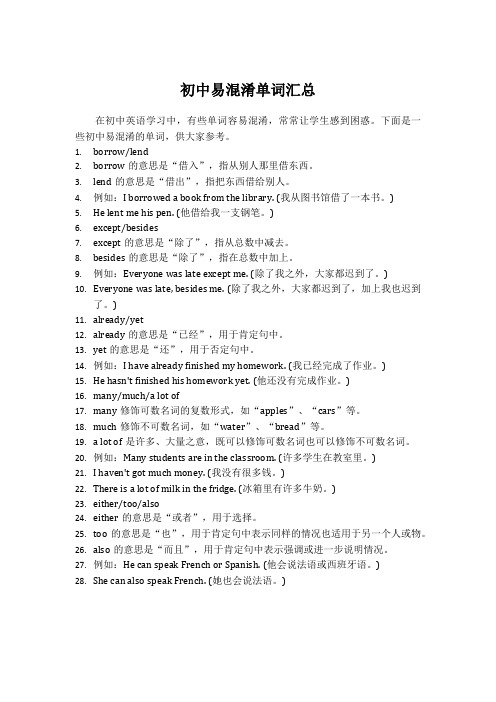
初中易混淆单词汇总在初中英语学习中,有些单词容易混淆,常常让学生感到困惑。
下面是一些初中易混淆的单词,供大家参考。
1.borrow/lend2.borrow的意思是“借入”,指从别人那里借东西。
3.lend的意思是“借出”,指把东西借给别人。
4.例如:I borrowed a book from the library. (我从图书馆借了一本书。
)5.He lent me his pen. (他借给我一支钢笔。
)6.except/besides7.except的意思是“除了”,指从总数中减去。
8.besides的意思是“除了”,指在总数中加上。
9.例如:Everyone was late except me. (除了我之外,大家都迟到了。
)10.Everyone was late, besides me. (除了我之外,大家都迟到了,加上我也迟到了。
)11.already/yet12.already的意思是“已经”,用于肯定句中。
13.yet的意思是“还”,用于否定句中。
14.例如:I have already finished my homework. (我已经完成了作业。
)15.He hasn't finished his homework yet. (他还没有完成作业。
)16.many/much/a lot of17.many修饰可数名词的复数形式,如“apples”、“cars”等。
18.much修饰不可数名词,如“water”、“bread”等。
19. a lot of是许多、大量之意,既可以修饰可数名词也可以修饰不可数名词。
20.例如:Many students are in the classroom. (许多学生在教室里。
)21.I haven't got much money. (我没有很多钱。
)22.There is a lot of milk in the fridge. (冰箱里有许多牛奶。
初中英语常见易混动词
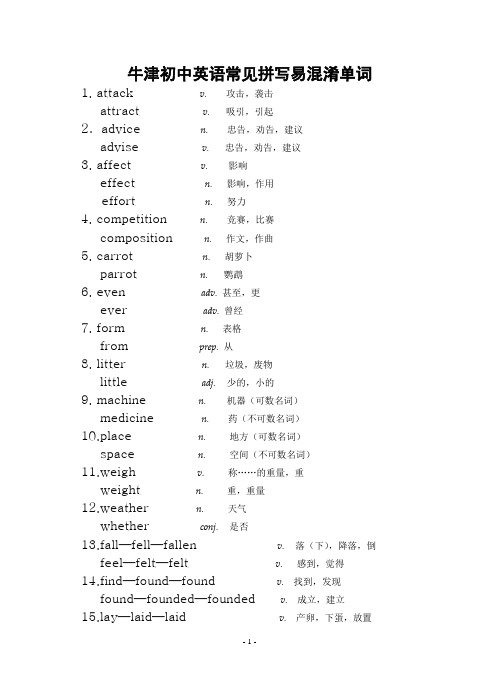
牛津初中英语常见拼写易混淆单词1. attack v. 攻击,袭击attract v.吸引,引起2.advice n.忠告,劝告,建议advise v.忠告,劝告,建议3. affect v.影响effect n.影响,作用effort n.努力4. competition n.竞赛,比赛composition n.作文,作曲5. carrot n. 胡萝卜parrot n.鹦鹉6. even adv.甚至,更ever adv.曾经7. form n.表格from prep.从8. litter n.垃圾,废物little adj.少的,小的9. machine n.机器(可数名词)medicine n. 药(不可数名词)10.place n. 地方(可数名词)space n. 空间(不可数名词)11.weigh v.称……的重量,重weight n. 重,重量12.weather n.天气whether conj.是否13.fall—fell—fallen v.落(下),降落,倒feel—felt—felt v.感到,觉得14.find—found—found v. 找到,发现found—founded—founded v. 成立,建立y—laid—laid v.产卵,下蛋,放置lie—lay—lain v.躺,位于16.collect v.收集,搜集connect v.连接,相连,联系correct v. 改正,纠正adj.正确的,对的17. except prep.除……之外expect v. 期望,预期,预料18.kitchen n.厨房chicken n.鸡, 鸡肉19.idea n. 主意,想法ideal adj.理想的,想象的20.medal n.奖牌(可数名词)metal n.金属(不可数名词)model n. 模型,模特儿(可数名词)21. quiet adj. 安静的,寂静的quite adv.相当,十分22. desert n.沙漠dessert n. 甜点23. tired adj.疲劳的,累的tried (try的过去式)v.试,试图,努力24. breath n. 呼吸breathe v.呼吸25. clean adj.清洁的,干净的v.把……弄干净,擦干净clear adj.清晰的,明亮的,清楚的26. practice n.练习practise(美practice)v.练习27. invent v. 发明,创造(invention n.发明物)invite v.邀请(invitation n.邀请)28. high adj. 高的height n.高,高度29. hard adj. 困难的adv.努力地hardly adv.几乎不30. lovely adj. 可爱的,好看的lively adj.活泼的,生气勃勃的likely adj.可能的31. through prep. 穿过,通过though conj.虽然,尽管thought(think过去式)v.想,认为32. cross v.穿过across prep. 穿过33. image n.图像,形象imagine v. 想象,设想34. region n.地区,行政区religion n. 宗教。
初中英语易混词辨析

初中英语易混词辨析-CAL-FENGHAI.-(YICAI)-Company One1中考易混淆的同义词总结1.say, speak, talk, tell这四个词都有“说”的意思,其用法差异主要在于各自强调的对象、内容不同。
(1)say的意思是“说”、“讲”、“说出”,是及物动词,强调“说”的内容。
不仅可指口头“说”,而且可指书面“说”。
eg: ① He said nothing to me. 他对我什么也没说。
② He said in his letter that he was getting on well with his life.他在信中说,他生活得很好。
固定搭配:say hello/good bye/sorry to sb. 向某人问候/告别/道歉say “ yes ” to sb . = agree with sb. 同意某人say “ no ” to sb. = disagree with sb. 不同意某人(2) speak表“说”、“讲”,它可以表示任何一种方式的“说话”。
它着重“说话”这一动作本身,而不强调所“说”的内容。
它通常为不及物动词,但它也可以作及物动词,后接the language、the truth、a word等,或接表示语言名称的名词。
eg: ①Please speak more slowly and clearly. 请说慢些和清楚些。
②Who is speaking 你是谁(打电话时用语)③Can you speak Japanese 你会讲日语吗固定搭配:speak to sb. 对某人说话speak highly of 称赞speak one’s mind 说心里话; 直言不讳(3) talk表示“交谈”、“谈话”,它指连贯地与人交谈,着重指说话的动作,而不强调说话的内容。
它一般用作不及物动词。
eg:①What are you talking about 你们在谈论什么②We are talking about the Chinese football match.我们在谈论中国足球比赛。
初中英语常考易混不定代词的用法
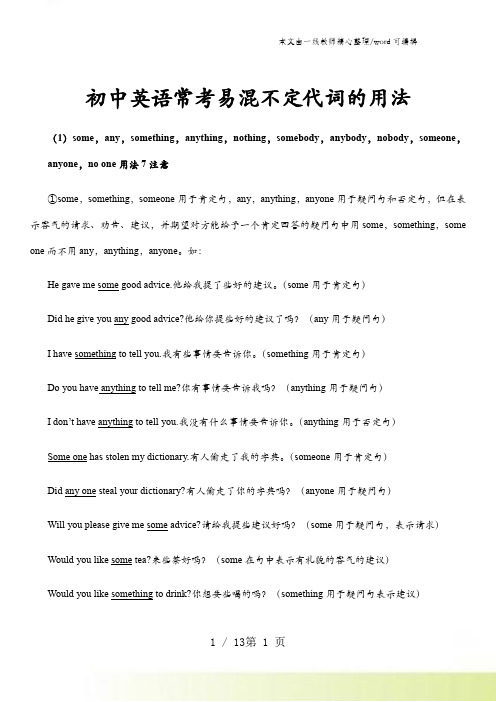
初中英语常考易混不定代词的用法(1)some,any,something,anything,nothing,somebody,anybody,nobody,someone,anyone,no one用法7注意①some,something,someone用于肯定句,any,anything,anyone用于疑问句和否定句,但在表示客气的请求、劝告、建议,并期望对方能给予一个肯定回答的疑问句中用some,something,some one而不用any,anything,anyone。
如:He gave me some good advice.他给我提了些好的建议。
(some用于肯定句)Did he give you any good advice?他给你提些好的建议了吗?(any用于疑问句)I have something to tell you.我有些事情要告诉你。
(something用于肯定句)Do you have anything to tell me?你有事情要告诉我吗?(anything用于疑问句)I don’t have anything to tell you.我没有什么事情要告诉你。
(anything用于否定句)Some one has stolen my dictionary.有人偷走了我的字典。
(someone用于肯定句)Did any one steal your dictionary?有人偷走了你的字典吗?(anyone用于疑问句)Will you please give me some advice?请给我提些建议好吗?(some用于疑问句,表示请求)Would you like some tea?来些茶好吗?(some在句中表示有礼貌的客气的建议)Would you like something to drink?你想要些喝的吗?(something用于疑问句表示建议)②any,anything,anybody,anyone有时也用于肯定句,但它表示“任何的、任何东西、任何人”的意思。
初中英语常见易混词汇辨析

初中英语常见易混词汇辨析在初中英语的学习中,同学们常常会遇到一些容易混淆的词汇,这些词汇在拼写、发音、词义或用法上有相似之处,给我们的理解和运用带来了一定的困难。
下面就为大家详细辨析一些常见的易混词汇。
一、“a”和“an”“a”和“an”都属于不定冠词,用于泛指一个人或事物。
“a”用于以辅音音素开头的单词前,“an”用于以元音音素开头的单词前。
需要注意的是,这里所说的“元音音素”和“辅音音素”指的是读音,而不是字母。
例如,“a book”(一本书),“an apple”(一个苹果)。
“hour”(小时)这个单词虽然以“h”开头,但“h”不发音,它的读音是以元音音素开头,所以应该说“an hour”。
二、“alone”和“lonely”“alone”表示“独自的,单独的”,侧重于指客观上的独自一人,没有同伴。
“lonely”则表示“孤独的,寂寞的”,侧重于指主观上感到孤独、寂寞,带有感情色彩。
例如,“He lives alone but he doesn't feel lonely”(他独自生活,但并不感到孤独。
)三、“bring”和“take”“bring”意为“带来,拿来”,指把某物从别处带到说话者所在的地方。
“take”意为“拿走,带走”,指把某物从说话者所在的地方带到别处。
例如,“Bring your book here”(把你的书带到这儿来。
)“Take this bag to your room”(把这个包拿到你的房间去。
)四、“in front of”和“in the front of”“in front of”表示“在……前面”,指在某个物体外部的前面。
“in the front of”也表示“在……前面”,但指在某个物体内部的前面。
例如,“There is a tree in front of the house”(房子前面有一棵树。
)“The driver is sitting in the front of the bus”(司机坐在公共汽车的前部。
初中容易搞混的英语单词

初中容易搞混的英语单词有很多初中的同学总是搞混英语单词,天天死记硬背但是却一点都记不住,考试的时候脑子一片空白,不怕,小编就太带给容易搞混的英语单词列表,大家可以参考一下。
初中常见的易混词1. abroad到国外go abroadboard板on board2. across 介词,表面穿过 walk across the roadcross 动词 cross the roadthrough 介词,空间穿过 go through the windowpast 介词,经过 walk past the post officepass 动词 pass the test3.alive 活着的 I am still alive.live 现场直播 is covered live居住 live in the citylively 活泼的 make his class lively and interestingliving make a living/ a living room4. lonely孤独 feel lonely孤零零 a lonely housealone独自 live alonealong沿着 walk along the street5. asleep 睡着的 fall asleepsleepy困倦的feel sleepy6. fall 落下,倒 fall downfell :fall的过去式 (fall—fell---fallen)feel 觉得 feel sleepy/tired---过去式felt7. badly---worseJim acted badly, but Tom did worse.well—betterHe plays football well and his father does better.8. boring, interesting, exciting, tiring…修饰物an interesting storybored, interested, excited, tired…修饰人 feel bored9. borrow 借进(以句子主语为参照物)May I borrow your pen?lend 借出(以句子主语为参照物)Could you lend me some money?keep 借一段时间How long can I keep the magazine?10. both两者都 Both of his parents are workers.all 三者以上都 All of my classmates are from China.neither 两者都不 Neither of my hands is clean.none没有一个(三者及以上)None of the four apples is/are red.nothing什么都没有There’s nothing in the fridge.11. care:take care ofcareful 形,仔细的be careful with firecarefully 副,仔细地 listen carefullycareless 形,粗心的 a careless studentcarelessly 副,粗心地drive carelesslycarelessness名,粗心 Your carelessness led to the mistake.12. take 带走(以说话者为中心)remember to take a raincoatbring 带来(以说话者为中心)bring your book herecarry 拿,无方向 Could you help me carry the books?13. close 动词,关闭close the door形,亲密的 my closest friendclosed 形,关着的 keep the door closed14. closely 副,密切地 work closely with us15. brave 形,勇敢的He is brave enough to save the old man.courage 名,勇气have the courage to tell him the bad newsbravely 副,勇敢地face the difficulties bravely16. dead 形,死的 have been deaddie 动,死亡 die of hungerdeath 名,死亡 the death of his pet makes him so sad.17. especially副,尤其 He is good at all subjects, especially maths.specially 副,专门 The pen is specially designed for the boy.special形,特殊的 a special day18. except 除了All the students except Tom will go for a school trip.expect 期待You are expected to bring it back when you return.19. excited形,激动的,修饰人feel excitedexciting形,激动人心的,修饰物 an exciting filmexcitedly 副,修饰人 shouted excitedlyexcitement名shout with excitement20.a little一些,修饰不可数名词 a little moneya few一些,修饰可数名词 a few treeslittle几乎没有,修饰不可数名词There’s little water in the glass, is it?few几乎没有,修饰可数名词 so few students21.form 形成 form a good reading habitfrom 从……22. France 法国/ French 法语German 德国的/ Germany 德国23. hard 努力 work hardhardly 几乎不 The boy hardly does his homework.24. healthy 健康的 keep healthyhealth 健康it’s good for your healthhealthily 健康地 eat healthily25. if 如果主将从现If he comes, I’ll call you.是否I don’t know if he will come here.whether 是否 (如与or连用,则用)I wonder whether he’ll come or not.weather 天气What will the weather be like tomorrow?26.include 动词包括The list includes the names of many famous writers.including 介词They have many pets, including three cats.27. invent 动词发明 Edison invented a lot of things.invention 名词发明 The invention made much difference to humans.inventor 名词发明者 Edison was a great inventor.28. last 上一个的 last year;最后的 make her last apperance动词,持续 The meeting will last one and a half hours.lasting 形,持久的 a lasting value29. lie 名词,谎言 tell a lie动词,说谎 He is always lying to us.动词,位于Japan lies to the east of China.动词,躺,平放 He likes lying on the grass.躺,平放;位于:lie—lay---lain说谎:lie-lied-lied30.luck 名,运气 good lucklucky 形,幸运的a lucky numberluckily 副,幸运的是 Luckily, we got better marks.unlucky/unluckily31. noise名,噪音Don’t make any noise.noisy 形,吵闹的 much too noisynoisily 副,吵闹地 talk noisily32. noise 噪音sound 声音We sat listening to the sound of the waves听起来 The music sounds beautiful.voice 嗓音 The singer has a sweet voice.33. provide 提供provide a chance for the boy=provide the boy with a chance offer :offer a chance to the boy=offer the boy a chance34. other别的,加名词 other studentsanother另一个I don’t like the pair of shoes, would you like to show me another pair?the other 两个中的另一个,常用one…the other Here is a shoe, where’s the other one?others= other+名词35. over/ under 年龄的上下above/ below温度,楼层的上下36. peace名词,和平 love peacepeaceful形,宁静的 a peaceful villagepeacefully 副,和平地we hope to solve the problem peacefully.37. pleasure名,乐意。
初中英语教研探讨易混词(3篇)

第1篇摘要:在初中英语教学中,易混词是学生学习过程中的难点之一。
本文针对初中英语易混词的特点,分析了易混词的成因,探讨了有效的教学策略,旨在提高学生的英语学习效率。
一、引言易混词是指在发音、拼写或意义上容易混淆的词汇。
在初中英语教学中,易混词的存在给学生的学习带来了很大困扰。
为了提高学生的英语水平,教师有必要对易混词进行深入研究和探讨,从而找到有效的教学方法。
二、初中英语易混词的特点1. 发音相似:如:to、too、two;see、sea、seafood等。
2. 拼写相似:如:there、their、they're;receive、rescue、rebuild等。
3. 意义相近:如:lose、miss;full、fuller、fullest等。
4. 形容词和副词混淆:如:big、bigger、biggest;well、worse、worst等。
5. 动词和名词混淆:如:study、studies;finish、finishing等。
三、初中英语易混词的成因1. 学生对英语语音、语调掌握不足:发音相似或相近的易混词容易混淆。
2. 学生对英语字母、字母组合的拼写规则掌握不牢固:拼写相似的易混词容易混淆。
3. 学生对英语词汇的意义理解不透彻:意义相近的易混词容易混淆。
4. 教学方法单一,缺乏针对性:教师在教学过程中,未能针对易混词的特点进行有针对性的教学。
四、初中英语易混词的教学策略1. 加强语音、语调训练:教师应引导学生正确发音,让学生熟悉易混词的发音特点,提高学生的语音、语调水平。
2. 强化字母、字母组合的拼写规则:教师应帮助学生掌握字母、字母组合的拼写规则,降低拼写相似易混词的混淆程度。
3. 深入挖掘词汇意义:教师应引导学生理解易混词的语义,区分意义相近的易混词。
4. 丰富教学方法,提高教学针对性:教师可以采用以下方法:(1)对比教学法:将易混词进行对比,让学生在对比中找出差异。
(2)游戏教学法:设计趣味性强的游戏,让学生在游戏中学习易混词。
初中英语易混单词
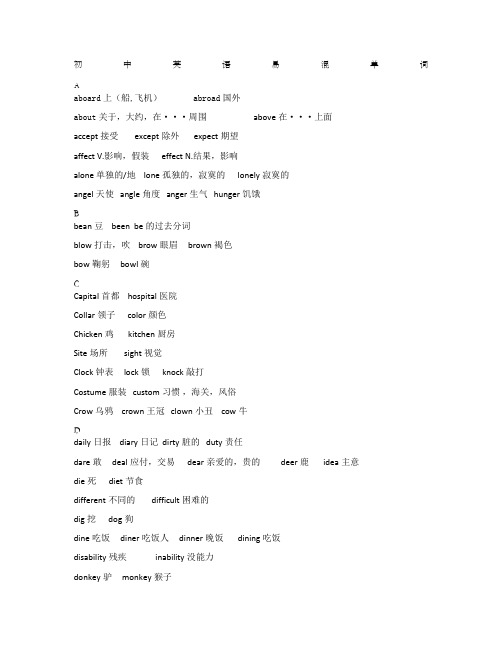
初中英语易混单词Aaboard上(船,飞机) abroad国外about关于,大约,在···周围 above在···上面accept接受 except除外 expect期望affect V.影响,假装 effect N.结果,影响alone 单独的/地 lone孤独的,寂寞的 lonely寂寞的angel天使 angle角度 anger生气 hunger饥饿Bbean豆 been be的过去分词blow打击,吹 brow眼眉 brown褐色bow鞠躬 bowl碗CCapital首都 hospital医院Collar领子 color颜色Chicken鸡 kitchen厨房Site场所 sight视觉Clock钟表 lock锁 knock敲打Costume服装 custom习惯,海关,风俗Crow乌鸦 crown王冠 clown小丑 cow牛Ddaily日报 diary日记 dirty脏的 duty责任dare敢 deal应付,交易 dear亲爱的,贵的 deer鹿 idea主意die死 diet节食different不同的 difficult困难的dig挖 dog狗dine吃饭 diner吃饭人 dinner晚饭 dining吃饭disability残疾 inability没能力donkey驴 monkey猴子drawn draw的过去分词 drown溺水Eeven甚至 event事件ever曾经 every每个 never绝不Ffail失败 fair公平的 fall落下 fire火fight打仗 flight航班fill充满 fool欺骗 full满的film电影 firm公司final最后的 find发现 fine好finish完成 fish鱼fine好 line线mine我的 nine九floor地板 flour面粉 flower花Ggoat山羊 gold黄金Hhair头发 hear听见 near在附近heat热度 hit打击hill小山 till直到honey蜂蜜 money钱 monkey猴子 Monday周一IInvention发明 invitation邀请Llater后来 lately最近 latest最近的 latter后者let让 letter字母,信 litter垃圾 little少许lie躺,放置,撒谎 line线 lion狮子life生活 wife妻子lock锁 knock敲打loose松的 lose丢失 loss损失 lost lose的过去式MMarch三月 match比赛,火柴,相称May五月 may也许meat肉 meet遇见medal勋章 metal金属 model模特medium中等的 museum博物馆mice老鼠,鼠标 nice好 rice米Monday周一 money钱 monkey猴子NNo不 know知道OOf······的 off离开PPolice警察 politics政治Purpose目的 suppose假设 support支持Qquiet 安静的 quite相当 quick快的Rreason理由 season季节SSea海 see看见Sheep绵羊 ship轮船 sleep睡觉Shelf架子 shell贝壳Socks短袜 stockings长筒袜Steal偷 steel钢Stick坚持 strict严格的Store商店 storey楼层 story故事Sweat汗水 sweet甜的TTax税 taxi出租车thorough彻底的 (at)though尽管 thought think的过去分词 through通过YYes是的 yet还。
- 1、下载文档前请自行甄别文档内容的完整性,平台不提供额外的编辑、内容补充、找答案等附加服务。
- 2、"仅部分预览"的文档,不可在线预览部分如存在完整性等问题,可反馈申请退款(可完整预览的文档不适用该条件!)。
- 3、如文档侵犯您的权益,请联系客服反馈,我们会尽快为您处理(人工客服工作时间:9:00-18:30)。
初中英语易混单词
A
aboard上(船,飞机) abroad国外
about关于,大约,在···周围 above在···上面
accept接受except除外 expect期望
affectV.影响,假装effect N.结果,影响
alone单独的/地 lone孤独的,寂寞的 lonely寂寞的
angel天使 angle角度anger生气 hunger饥饿
B
bean豆been be的过去分词
blow打击,吹brow眼眉 brown褐色
bow鞠躬bowl碗
C
Capital首都hospital医院
Collar领子 color颜色
Chicken鸡 kitchen厨房
Site场所 sight视觉
Clock钟表 lock锁 knock敲打
Costume服装custom习惯,海关,风俗
Crow乌鸦 crown王冠clown小丑cow牛
D
daily日报 diary日记 dirty脏的 duty责任
dare敢 deal应付,交易 dear亲爱的,贵的deer鹿 idea主意die死 diet节食
different不同的difficult困难的
dig挖dog狗
dine吃饭diner吃饭人 dinner晚饭dining吃饭disability残疾 inability没能力
donkey驴monkey猴子
drawn draw的过去分词 drown溺水
E
even甚至 event事件
ever曾经 every每个 never绝不
F
fail失败 fair公平的 fall落下 fire火
fight打仗flight航班
fill充满 fool欺骗 full满的
film电影firm公司
final最后的find发现fine好
finish完成fish鱼
fine好line线
mine我的nine九
floor地板 flour面粉 flower花
G
goat山羊gold黄金
H
hair头发 hear听见 near在附近
heat热度hit打击
hill小山till直到
honey蜂蜜money钱 monkey猴子 Monday周一
I
Invention发明 invitation邀请
L
later后来lately最近 latest最近的 latter后者
let让letter字母,信litter垃圾 little少许
lie躺,放置,撒谎 line线lion狮子
life生活 wife妻子
lock锁 knock敲打
loose松的lose丢失 loss损失 lost lose的过去式M
March三月 match比赛,火柴,相称
May五月 may也许
meat肉meet遇见
medal勋章 metal金属model模特
medium中等的 museum博物馆
mice老鼠,鼠标 nice好 rice米
Monday周一 money钱monkey猴子
N
No不know知道
O
Of······的off离开
P
Police警察politics政治
Purpose目的 suppose假设support支持
Q
quiet安静的quite相当 quick快的
R
reason理由season季节
S
Sea海 see看见
Sheep绵羊 ship轮船sleep睡觉
Shelf架子 shell贝壳
Socks短袜 stockings长筒袜
Steal偷 steel钢
Stick坚持 strict严格的
Store商店storey楼层story故事
Sweat汗水sweet甜的
T
Tax税 taxi出租车
thorough彻底的(at)though尽管 thoughtthink的过去分词 through通过Y
Yes是的yet还。
